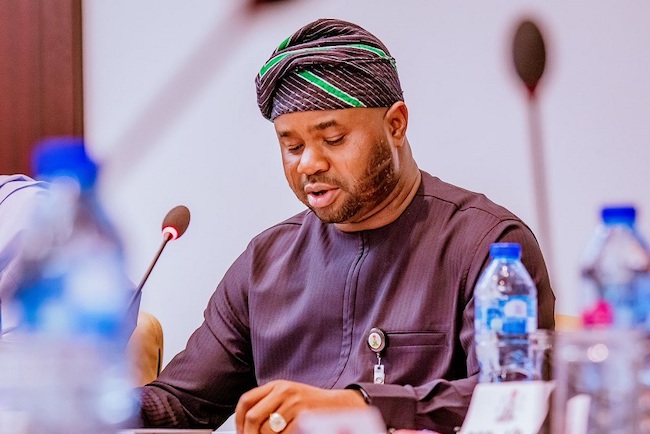
FEDERAL GOVERNMENT EYES N5TRN VAT IN 2024
The Federal Inland Revenue Service has said that the Federal Government is eyeing a Value Added Tax of N5 trillion in 2024 while also putting mechanisms in place to close identified tax gaps.
It also said that the FG was ready to align with the Economic Community of West Africa State’s directive on tax reform.
The Chairman of the FIRS, Zacch Adedeji, said this at a press conference organised by the Support Programme for Tax Transactions in West Africa, a programme supported by the European Union and ECOWAS in Abuja on Thursday.
The chairman, represented by an official of the agency, Mr Matthew Osanekwe said the VAT has been on the increase since 2019 quoting N1.9trn, N1.5trn, N2.5trn, N2.3trn and 3.6trn in 2019, 2020, 2021, 2022 and 2023 respectively.
He added that the government is aligning with Aeticle 30 of the ECOWAS on tax reforms.
[BREAKING] OKUAMA KILLINGS: NIGERIAN ARMY DECLARES EIGHT PERSONS WANTED [FULL LIST]
Article 30 of ECOWAS VAT reform states that, “Each member state shall have the liberty to fix the VAT rate applicable to taxable operations within a bracket ranging between 5 and 20 0/0. However, member states could establish a reduced rate whose scope and rate shall be determined by the Council of Ministers.”
Earlier, the FIRS said the apex government expects N19.41trn revenue from the FIRS in 2024.
This target represents an increase of 56.91 per cent from the previous year’s actual and 67.91 per cent from the previous year’s target.
“The VAT rate shall also be applicable to merchandise and services produced locally as well as taxable goods imported with the exclusion of the export of goods or equivalent, which are operations submitted to zero tax,” he said.
Osanekwe said there was a discussion at the National Assembly to pass the VAT reform into law, after which, it is expected that the VAT would increase to about N5trn from the current N3.6trn.
“From 2019, VAT has improved significantly in the country. As you can notice, there is a trajectory of increase. What we are doing at the FIRS is to look at issues of policy. Nigeria VAT was at five per cent and then reviewed to seven per cent after some policy recommendations.
“We are also aligning with ECOWAS directive on Article 30. The work is ongoing, and very soon, we will call on stakeholders when necessary. Another thing we are doing is to expand the scope of the VAT collection in the country. We now collect tax from non-resident resource suppliers like Google, Amazon, etc. We also use collection agents like the Deposit Money Banks and telecommunication companies.
“The report of the programme we had with PATF was sent to the FIRS management, and the recommendations have been adopted. For instance, for us to move from the Net Profit method to the Full Consumption method of tax collection is work in progress according to article 10. Since we are allowed to set our threshold, according to Article 30.
“We have discovered some VAT gaps, and we are working with the United Nations Development Programme to train out workers on VAT gap analysis. Once that is completed, we look forward to a VAT of about N5trn in 2024,” he added.
Also speaking at the conference, the Head of cooperation of the European Union Delegation to Nigeria, Mr. Massimo De Luca, reiterated the EU/ECOWAS stands on Nigeria VAT, stating that it remains low because citizens passive misuse of resources on the part of the government.
He expressed satisfaction with the PATF and said it is optimistic that VAT will work in Nigeria.
“Tax in NIgeria remain very low compared to other regions countries in the region. Citizens perceive that the taxes they pay are not being judiciously utilized and, hence, are reluctant to pay additional money on VAT. We are happy with the project carried out by PATF, and we are looking at sustaining efforts in the future. There is much to be done in terms of improving VAT in Nigeria,” he said.
Also Speaking at the conference, the representative of PATF, Mr Andrew Onyeanakwe, noted that the overall aim of PATF is to implement the Fiscal Transition Programme in West Africa, following the implementation of regional trade liberalization policies and to strengthen the domestic tax revenue mobilization capacities of ECOWAS member states and Mauritania.
Some of the achievement of the PATF highlighted by Onyenakwe, representative of PATF in Nigeria include: Development of Regional Tax Management Tools; Directive C/DIR.4/07/23 on the harmonization of the methodology for evaluating tax expenditure in ECOWAS Member States; Directive C/DIR. 5/07/23 Establishing the institutional mechanism for monitoring and evaluating ECOWAS Fiscal Transition.
